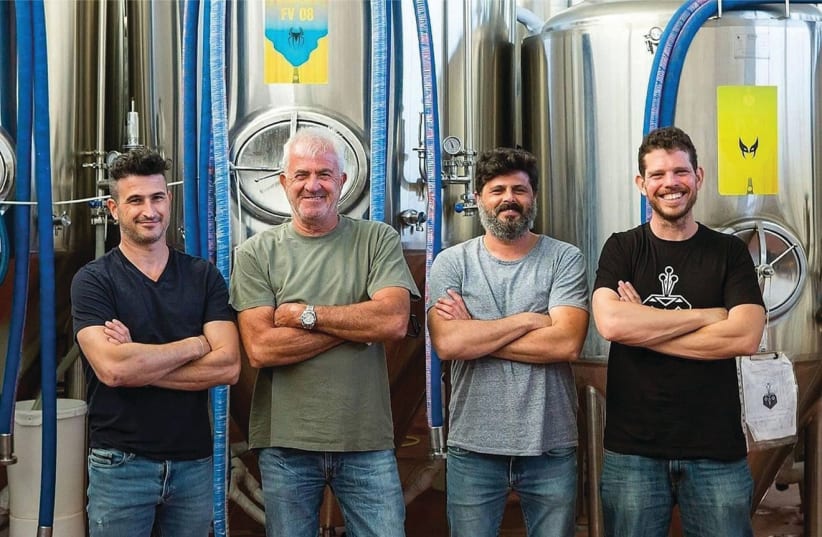The orchards were founded in 1906 by the great-grandfather of the two current owners, brothers Ben and Gal Alon. (Klotsman, which means “woodsman” or “woodworker” in German, was Hebraized to Alon, which means “oak tree,” a generation ago.) Among the rare citrus fruits grown there are 10-12 varieties of lemons grown only in a few countries outside of their native lands.
“We sell our lemons to individuals, mostly food enthusiasts, and gourmet restaurants,” says Ben Alon. “Lior Weiss, the brewmaster at the BeerBazaar Brewery, and I thought of the idea of making beer with four varieties of these lemons: the Interdonato, Bergamot, Calamansi and Kafir Lime. We chose different beer styles to appropriately enhance the aromas and tastes of the different lemons. The first two are grown mainly for the zest from their outer rind. The inner rind and pulp are too bitter for use.”
The two most well-known products from these lemons are Lemoncello, a popular Italian aperitif, which incorporates the rind of the Interdonato, and Earl Grey tea, which is flavored with oil from the skin of the Bergamot.
“For these beers,” explains Alon, “I grated all of the lemons by myself. I hope that these beers will give people a taste of the terroir of our orchard: the water, the earth, the sunshine.”
All four of the beers are named after the lemons. Interdonato, according to Lior Weiss, “is based on American pale ale, and we dry-hop it with Citra hops and lemon zest.”
SO WHAT does this bring us?
Interdonato beer is a clear, light orange color with a big foamy head. The aroma is rather grassy, but you also get the smell of lemon tea. Perhaps with lemons, you would expect a sour taste, but there isn’t much of that. What there is is a full bitterness, perked up with tastes of lemon tea and lemon Popsicle. It’s a taste that makes you thirsty, which is not bad in a beer since you want to keep drinking. Alcohol is a moderate 5.2%.
The base for the Bergamot beer is the Saison style. It’s a darker color than Interdonato and a little stronger (6.2% alcohol). It doesn’t have the lemon tea taste, but more like lemon and honey, or “lemon in gravy,” as my drinking partner Moshe said. You also can’t mistake the very distinctive taste of Saison yeast. The finish is long and bitter.
The Bergamot, we agreed, is the more complex and sophisticated of the two, but the Interdonato was more interesting and, in the end, more enjoyable.
Introduced at a later date was the Calamansi beer. This is a pale ale, 4.5% alcohol, brewed with the skin and pulp of the calamansi lime, claimed as native by both Malaysia and the Philippines.
“This is a small fruit in the kumquat family,” says Ben Alon. “We use both the pulp, which is very bitter, and the skin, which is sweeter. This gives the beer a good balance and delivers a taste which is fresh with the sun and the blossoms, like you are swimming in the orchard.”
As much as I appreciate Alon’s poetry, I had to taste the beer for myself. It pours out a lightly cloudy amber with noticeable carbonation. The aroma brings together a harsh lemon, a bitter orange peel, and fresh-cut grass. So, yes, you can say that you get the smell of the orchard. When it first hits your tongue, there’s the citrus bitterness, but right afterward you taste the lemon zest. There’s no mistaking that this beer, like the others, is lemon-centered.
If most beers aim for some kind of a balance between the bitter hops and the sweeter malt, Calamansi strikes a balance between the bitter and the sour – within the same fruit. We believe it goes well with much of our Israeli cuisine, and is suitable more for our Israeli summer.
The latest beer in the series is Kafir Lime, which is made with the leaves of the tree rather than the fruit itself.
Ben Alon revealed a surprising fact: “The Ministry of Agriculture does not allow any kafir lime trees to be grown in Israel. Apparently, the trees tend to carry a plant disease called greening, which destroys other citrus trees. To brew the beer, we imported leaves from Thailand, where kafir limes are an important part of the local cuisine.”
The base of this beer is an English bitter, and the alcohol is a moderate 5.2%.
Getting poetic again, Alon likened the flavor of the beer to “swimming in a cold Thai soup.”
Well, I’ve never done that, but I can say that the Kafir Lime beer is as lemony as the other three, but also more mellow. It’s bitter rather than sour, with aromas of lemon drops and malt, and tastes of lemon and vegetation. You even get the sweetness of the lemon as the beer warms up a bit. The body is thin with active carbonation, and the finish is short and bitter.
Producing these four rare lemon beers was a brave step by BeerBazaar and Klotsman Orchards. While tasty, they are clearly outside of the comfort zone of most beer drinkers.
The writer is the owner of MediawiSe, an agency for advertising and direct marketing in Jerusalem. He writes a web log on Israeli craft beers at www.IsraelBrewsAndViews.blogspot.co.il
